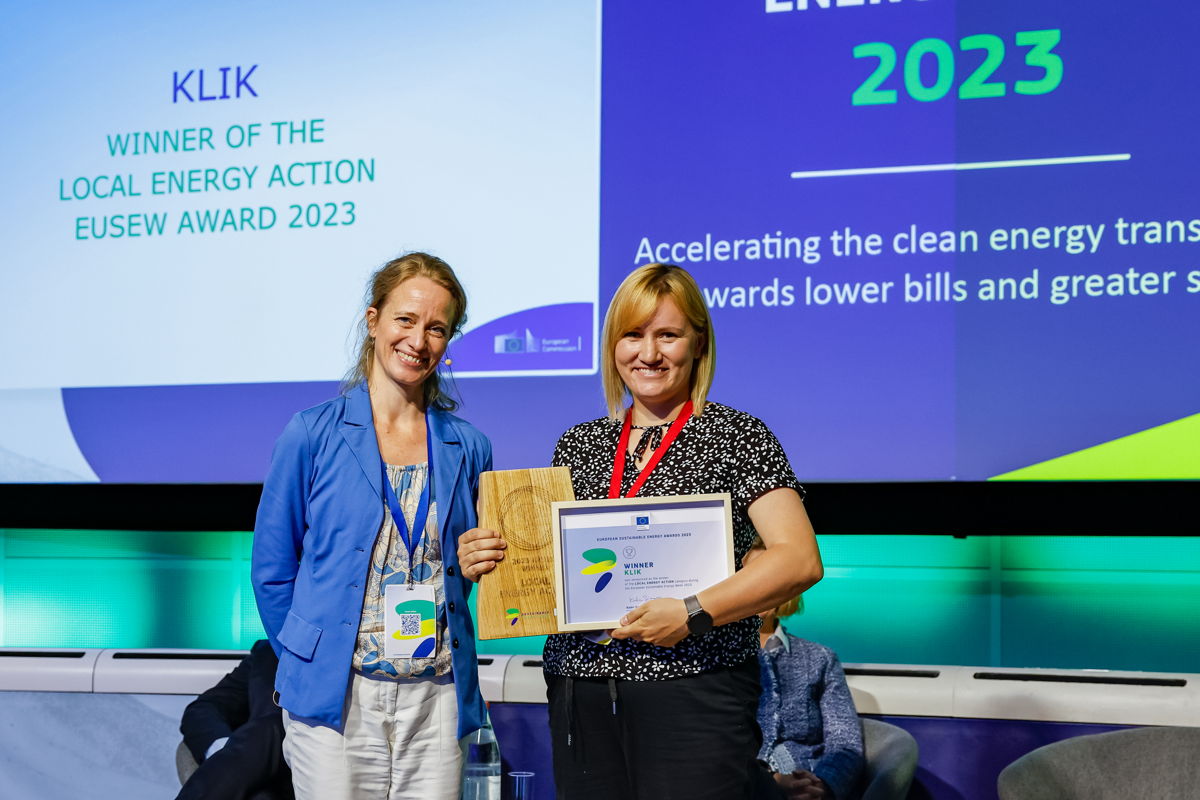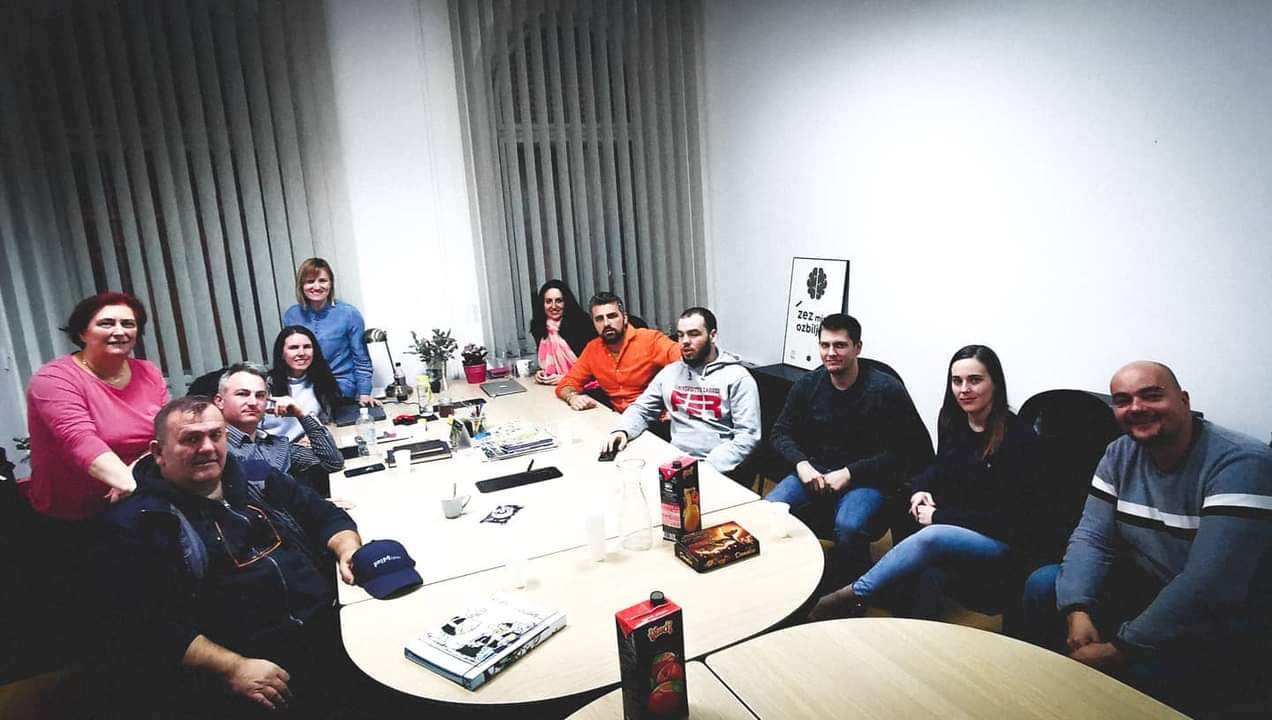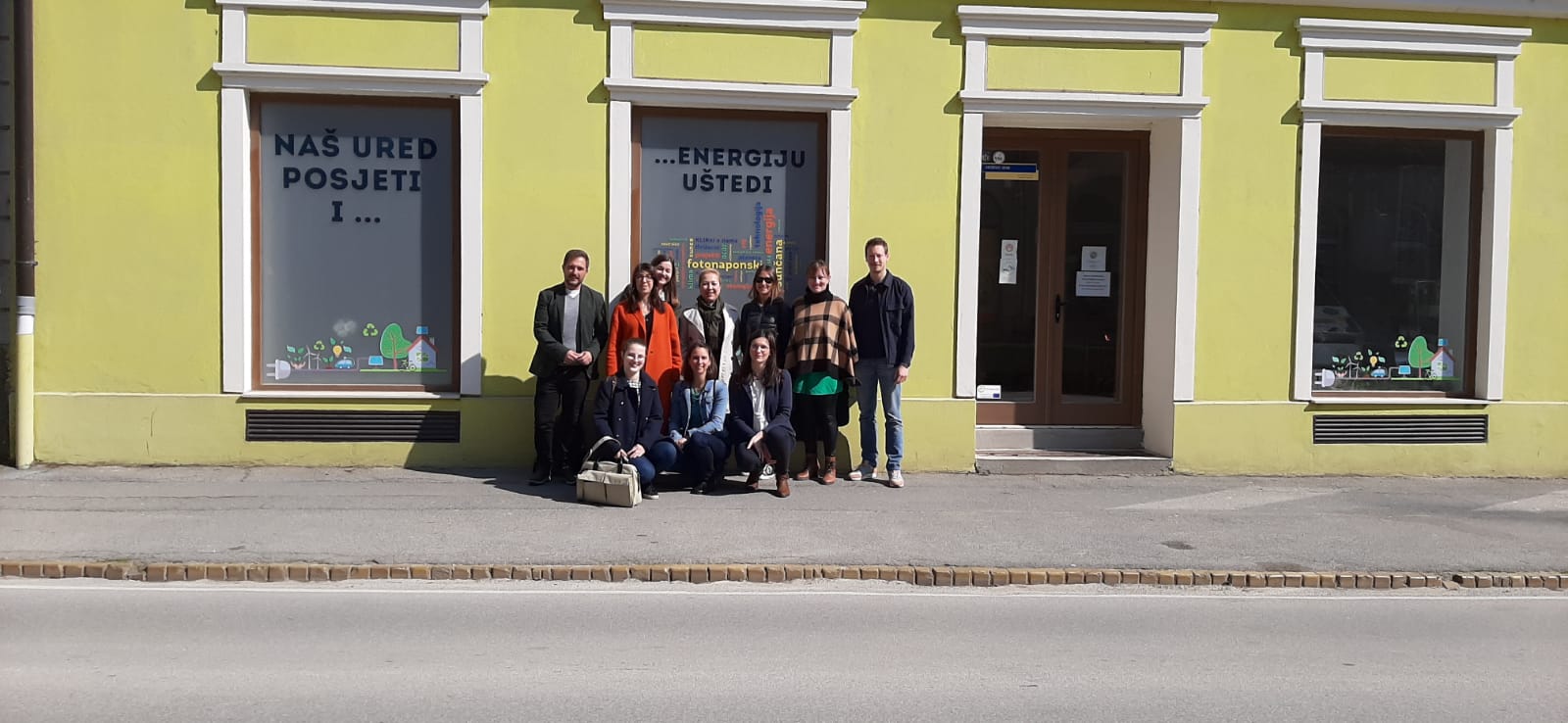
During the presentation of the European prize - photo KLIK
A women's cooperative that serves as an information point for energy and climate issues: in 2023, KLIK received the European Commission's European Sustainable Energy award for developing an energy community in Croatia "that brings clean energy to citizens"
KLIK is the Laboratory for Climate Innovation in Križevci, a municipality of around 20,000 inhabitants about seventy kilometers north-east of Zagreb. It is a cooperative founded in 2020 on the initiative of twelve citizens and which acts as an information point for all energy and climate issues. In 2023, KLIK received the European Commission's European Sustainable Energy (EUSEW) award "for developing an energy community in Croatia that brings clean energy to citizens". We interviewed Ivana Šatrak, KLIK educator.
How was KLIK born?
KLIK has its roots in the project “Sunčani krovovi” [literally “sunny roofs”, ed.], initiated by the municipality of Križevci and the Zelena energetska zadruga (ZEZ). It was the first energy-themed crowdfunding in Croatia and allowed the installation of solar panels on the municipal library and business centre of Križevci. That experience stemmed the idea of founding a cooperative to financially support more projects of that type. In 2020, twelve citizens – mostly women – founded KLIK and in 2021 we started working. Today there are two of us, but we recently won a couple of projects and now we will be able to hire 2-3 more people.
In 2021 you opened the Climate Energy Office. What is it about?
It is a place where citizens can come to find out about energy and climate projects. We have long dreamt of having a space like this, in 2021 the municipality made a space available to us and we set off. We provide training and workshops, we have a meeting room and a showroom where we show some green technological solutions that various companies in the area have sent us. We have solar panels, heat pumps, photovoltaic tiles, small composters… this office open to all (we have also received applications from Bosnia!) has made us popular in Croatia and Europe.
It also won you the European Commission award…
Yes, we didn't think we had a chance to win. When we found out we were over the moon. We have been recognised as an entity that does something positive, and this at a European level. It's very important to us, a real honour. The Commission has positively assessed the work we carry out through the office, our citizen advice service and one-stop-shop for the installation of solar panels. We have also recently started the "crOss renoHome" project, which will allow us to provide the same service for all energy redevelopments. It is not an easy process and we will be able to accompany citizens from start to finish, from planning to managing suppliers.
There is a lot of talk about energy redevelopments at the moment in Croatia. It seems like everyone wants to get their building back on track. What is the situation in the country?
Actually, not good. We have many old properties in which no one has invested for years. On the other hand, there are many buildings that are not legalised or have documents not completely in order. Since the online service oss.uredjenazemlja.hr has existed, it has been possible to consult the land registry online and easily check the state of affairs. The result is that many people, even if they want to start an energy redevelopment, do not have the necessary documents. We need a new phase of legalisation, which allows you to bring a home up to code by paying a fine. Otherwise many cases will remain blocked.
When an owner has all the necessary documents, how does energy requalification proceed? What difficulties do you encounter and what are the costs?
It is not easy to juggle planning and managing of works. This is why we want to offer a team of people at the service of citizens. Many fear wasting time and feel cheated when, due to some technicality, or because they did not apply in time, they are unable to obtain public funding. From a financial point of view, it is difficult to indicate an amount, because it depends on the surface area of the property, the materials used, the type of work you want to do and the initial state of the building. However, the grant is always a maximum of 60%, unless the property has been damaged by the earthquake, in which case it rises to 80% of the expense incurred. People are ready to invest, but prices have risen and the situation is ideal for no one. The elderly wait for the young to take care of it, but the latter often do not have the means. These are conversations we hear every day.
What are your relations with the municipality of Križevci?
Journalists often think we are a municipal office. But we are not! We are a city cooperative that finances itself through its projects. However, the relationship with the municipality is excellent. We started collaborating together on the “Future Cities of South East Europe” project and have been in constant contact since then. We report any useful calls to them and they do the same.
What do you feel like asking the Croatian government instead?
The regulations governing cooperatives should be improved. There is a European directive on energy communities , we should look at what is done elsewhere in Europe and put our laws into action. Today the situation in Croatia is unclear, the cooperative is often framed as a business, which disadvantages its members. We are also lagging behind when it comes to energy transfers and city investments in this sector.
What are your plans for the future?
We are working on the construction of a photovoltaic power plant of approximately 50KW. It is a project that would allow our citizens to become members and invest. We want people to see that renewable energy can also be profitable. In 2021 we launched a small festival around the concept of sustainability and we plan to continue. Finally, we are involved in several projects, including an Interreg where we collaborate with twelve other partners. It is very important for us to work at a regional level and share this positive story of ours.
This content is published in the context of the "Energy4Future" project co-financed by the European Union (EU). The EU is in no way responsible for the information or views expressed within the framework of the project. The responsibility for the contents lies solely with OBC Transeuropa. Go to the "Energy4Future"








